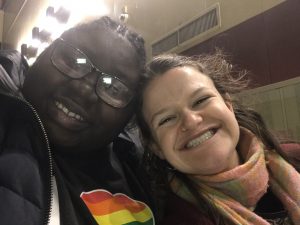
On a cold Tuesday night, we pulled into Bulkeley High School to attend the Hartford Public School Board of Education meeting. We filed into the school, through the fluorescent hallways into the central auditorium. We were joined by about forty other community members in the audience along with the board members, and by about 5:30, the final stragglers entered the auditorium. The audience for the meeting included mostly adults of color, some in groups, some with children, and some sitting individually. The light chatter and movements quieted as the meeting started and as the chairman, Craig Stallings, began his opening remarks and provided overview of the meeting agenda. His words were then echoed by another board member in Spanish. After the agenda, the meeting turned swiftly into the public comment segment of the night in which a total of five adults spoke for three minutes each.
A middle-aged black woman sat in front of the microphone and began her testimony to the board. She talked about her son’s fifth grade class and how the principal teacher for the year had been absent since December. She expressed her concerns about how this absence was affecting her son’s access to a quality education because no homework had been assigned since the absence began. After her testimony, three other community members addressed the committee and shared their own concerns in the allotted time. One was another black mother who spoke to her concerns about grade performances and reliance on standardized tests that did not reflect, in her opinion, the true potential or abilities of the students. She also mentioned the physical status of the schools in Hartford and how she was disappointed when she walked in the hallways of her son’s school. Next, a white teacher testified about the unfair termination of a fellow faculty member earlier in the year. He warned that a lawsuit was coming and echoed the previous woman’s concerns about the status of the schools.
Lastly, a mother from the local Hartford activist group part of Make the Road Connecticut, Madres Guerreras, shared her experiences and concerns with the public school system. She spoke in Spanish, and after each paragraph, a community organizer translated her words into English. Last semester, I mentored for the Community Action Gateway Class and worked with groups of students to partner with local organizations. One group worked with Madres Guerreras and created a promotional video about their efforts, accomplishments, and goals. I spoke with the principle community organizer, Mirka Dominguez-Salinas, after the testimony and expressed how nice it was to see a familiar fact at the meeting. In every interaction I have had with the Madres Guerreras, they have proved to be a strong, powerful group of women fighting for their rights. The woman who testified at the meeting spoke of those rights and how she, and the rest of the Hartford parents, wanted respect from the schools. She argued that the schools needed to only employ teachers with a guaranteed certification, to create extra-hour help session for students, to institute more parent interpretation at meetings, and to hold workshops on the school system for parents.
After the public comment segment of the meeting, the board moved into the election of the officers. A position would be highlighted, a nomination a board member would occur, and then the members voted on the position. The new elected members were: Julio Flores and Chairman, Juan Hernandez as Vice-Chair, Kimberly Oliver as Second Vice-Chair, and Ayesha Clarke as Secretary.
After the elections, there was a break in the meeting and we walked out into the lobby and ran into the previous chairman, Craig Stallings. We introduced ourselves as Trinity students and talked with him briefly about his time as chairman and what he had seen change in the Hartford public school system. He told us that a recent goal of the board was restructured the budget from a “student-based budget, [to a] needs-based budgets, and now…an equity-based budget”. He said that “the whole purpose is to reduce the size of the district to a manageable size” for better oversight and management. Besides the budget, Stallings said the primary focus of the board is to “figure out how [they] can have a quality neighborhood school system and a quality regional system and how they can coexist”.
